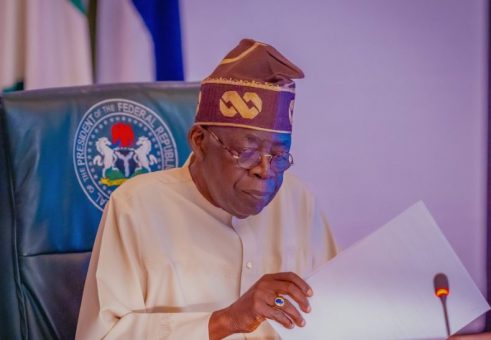
President Bola Ahmed Tinubu has urged the business and banking community to prioritize capacity building, talent development, and youth empowerment as essential drivers of Nigeria’s future economic growth.
Represented by Vice President, Senator Kashim Shettima, President Tinubu delivered this message at the 17th Annual Banking and Finance Conference organised by the Chartered Institute of Bankers of Nigeria (CIBN) in Abuja on Tuesday.
To promote financial inclusion and drive innovation, the Tinubu administration has prioritized the digital economy.
Through programs like Digital Nigeria, the government is expanding broadband access and fostering the growth of tech startups.
President Tinubu then disclosed that the government is currently training 3 million Nigerian youths in digital technology and essential skills, with plans to deploy them to innovation firms across the country.
“We are committed to achieving a 70 percent digital literacy level by 2027 through collaboration and innovation.
“We must focus on capacity building, talent development, and youth empowerment. These are the hands of our youth, and we must equip them with the skills, knowledge, and opportunities needed to drive our nation forward,” Tinubu stated.
He emphasized that these initiatives will be critical to Nigeria’s progress, adding, “The journey ahead will require determination, but I am confident that with the support of the Nigerian banking and finance sector, we can accelerate economic growth and ensure prosperity for all Nigerians.”
President Tinubu outlined the government’s plan to restore confidence in the Nigerian economy, emphasizing measures to reduce inflation, stabilize the foreign exchange market, and improve fiscal management.
The removal of the fuel subsidy, he explained, is a key short-term strategy aimed at freeing up budgetary resources for critical investments in infrastructure and social services.
“Our focus is on strengthening infrastructure development,” Tinubu noted, highlighting the administration’s commitment to upgrading roads, railways, and energy projects through public-private partnerships. “We are reducing transportation costs and improving market access by investing in infrastructure that supports economic growth.”
He further stressed the importance of financial inclusion, noting that formal financial inclusion in Nigeria grew from 56% in 2020 to 64% in 2023.
“This progress has been driven by increased bank access and advancements in non-bank areas, such as mobile money services,” he stated.
President Tinubu reaffirmed his administration’s commitment to climate finance and environmental sustainability.
He cited the Green Bond Program and partnerships with international development agencies as key initiatives for mobilizing resources to fund projects aimed at reducing Nigeria’s carbon footprint.
“Our climate finance initiatives are designed to mitigate the impact of climate change on our economy and promote sustainable development,” Tinubu said.
Speaking on fiscal policies, Minister of Finance and Coordinating Minister of the Economy, Mr. Wale Edun, assured that the ongoing reforms are expected to help Nigeria achieve a 3.7 percent economic growth target by the end of the year.
“The oil and gas sector saw a 10% increase in the second quarter, while the non-oil sector maintained steady growth at 2.8%,” he reported. However, Edun acknowledged that challenges remain in sectors like transportation, manufacturing, and retail trade due to economic shocks.
To alleviate transportation costs, Edun announced plans to enhance the supply of Premium Motor Spirit (PMS) by 25 million litres starting in September, through the Dangote refinery.
The procurement of biofuel buses and compressed natural gas (CNG) conversion kits was also highlighted as part of efforts to reduce reliance on petrol and diesel, which contribute to high production and transportation costs.
Edun added that government revenue collection reforms are yielding positive results, with aggregate federal revenue for the first half of 2024 reaching N9.1 trillion, more than double the amount collected in the same period in 2023. Non-oil revenue increased by 30 percent, surpassing budget expectations.
While acknowledging the progress made in controlling inflation, Edun noted that food inflation remains a significant challenge.
“The consumer price index eased from 34 percent in June to 33 percent in July, but food prices continue to rise sharply,” he said.
The government is implementing several initiatives to boost food supply and tackle food inflation, including strategic import programs and efforts to enhance local food production.
Edun also highlighted the administration’s focus on improving agricultural productivity. “We are working to increase staple crop production from 127 million metric tons in 2023 to 135 million metric tons by the end of the year,” he announced. These efforts include providing fertilizers and seeds to smallholder farmers and fostering partnerships with large-scale commercial farmers.
Addressing the energy sector, the finance minister stated that the government is targeting an increase in electricity supply from the national grid, with plans to boost output from 4.5 gigawatts to 6 gigawatts by the end of 2024. Oil production is also set to rise to 2 million barrels per day as part of efforts to enhance the sector’s competitiveness and attract further investments.
The administration’s healthcare reforms are focused on improving access to essential medicines for 80 to 90 million Nigerians. Wale Edun also mentioned that healthcare insurance coverage for one million vulnerable people is being expanded through the Vulnerable Group Fund, in collaboration with state governments.
He emphasized the importance of collaboration between the government, private industry, and civil society to achieve sustained economic growth. “To ensure long-term growth, we must align our policies with the changing global landscape, but this requires strategic investments from the private sector,” he stated.
In addition to domestic reforms, the administration is working closely with international financial institutions and development partners to unlock the necessary investments to support economic advancement. The issuance of a $500 million bond earlier this month is expected to finance critical programs across the economy, including a nationwide student housing initiative in collaboration with Family Home Funds.
The Governor of the Central Bank of Nigeria (CBN) represented by Dr. Blaise Ijebor Director, Risk Management Department, noted that as bankers “bankers are not just critical stakeholders but also more of a track driver of inclusive growth and because of that our decisions and actions have significant consequences on the lives of millions of Nigerians and indeed Africans”.
The Central Bank of Nigeria he said has been said before looking forward to the actionable points that will come out of these deliberations of the conference “because it will help to move this country forward especially as we journey towards a one trillion dollar economy envisioned by the president of the federal republic of Nigeria”.
At the conference, Mr. Tony Elumelu, Chairman of Heirs Holding, who delivered the keynote address, called for urgent measures to address insecurity, which he cited as a key driver of food inflation and economic instability. “We must prioritize security to protect our people, attract investment, and foster change,” Elumelu stressed.
He also underscored the need to support youth entrepreneurship, urging the government and private sector to create opportunities that allow young Nigerians to realize their potential within the country.
According to him, “We must incentivize our youth to embrace the challenge of driving economic growth. We face a choice. Either we offer our young a future where opportunity is absent in Nigeria, forcing our best and brightest to leave, to undertake tough journeys that split families and destroy lives.
Or we create a Nigeria where value and well-being can take place at home, not abroad, where our young ones can realize their dreams in Nigeria, for Nigeria. By supporting their businesses and creating an enabling environment, we can collectively empower small and medium-scale enterprises to catalyze our progress during these transformative and challenging times. We must not waste the current times we live in.”

